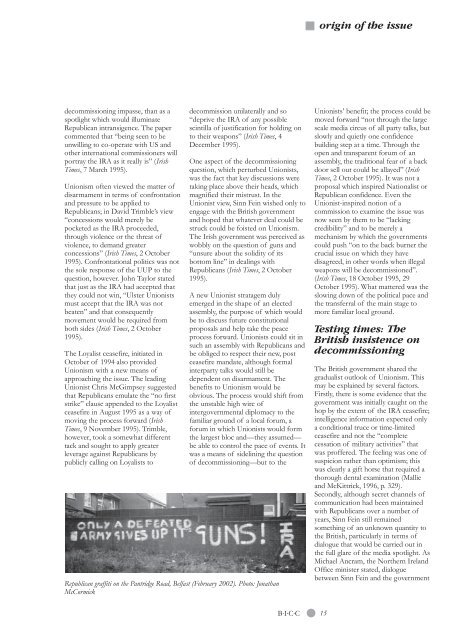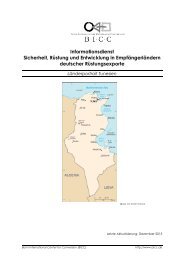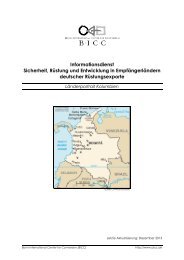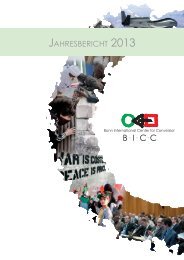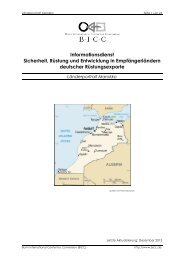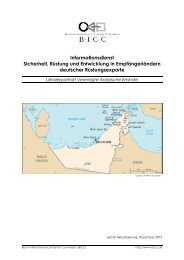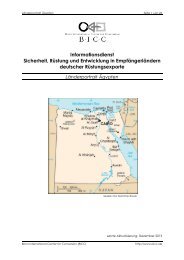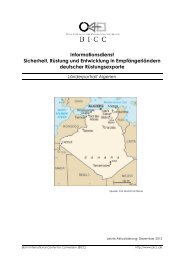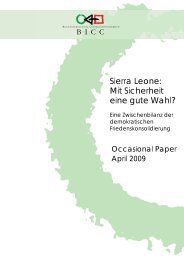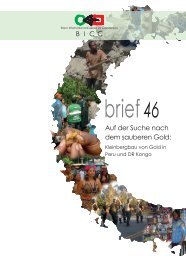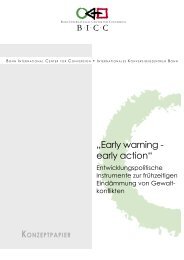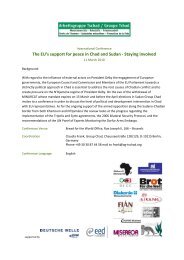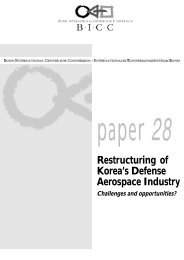English - BICC
English - BICC
English - BICC
You also want an ePaper? Increase the reach of your titles
YUMPU automatically turns print PDFs into web optimized ePapers that Google loves.
decommissioning impasse, than as a<br />
spotlight which would illuminate<br />
Republican intransigence. The paper<br />
commented that “being seen to be<br />
unwilling to co-operate with US and<br />
other international commissioners will<br />
portray the IRA as it really is” (Irish<br />
Times, 7 March 1995).<br />
Unionism often viewed the matter of<br />
disarmament in terms of confrontation<br />
and pressure to be applied to<br />
Republicans; in David Trimble’s view<br />
“concessions would merely be<br />
pocketed as the IRA proceeded,<br />
through violence or the threat of<br />
violence, to demand greater<br />
concessions” (Irish Times, 2 October<br />
1995). Confrontational politics was not<br />
the sole response of the UUP to the<br />
question, however. John Taylor stated<br />
that just as the IRA had accepted that<br />
they could not win, “Ulster Unionists<br />
must accept that the IRA was not<br />
beaten” and that consequently<br />
movement would be required from<br />
both sides (Irish Times, 2 October<br />
1995).<br />
The Loyalist ceasefire, initiated in<br />
October of 1994 also provided<br />
Unionism with a new means of<br />
approaching the issue. The leading<br />
Unionist Chris McGimpsey suggested<br />
that Republicans emulate the “no first<br />
strike” clause appended to the Loyalist<br />
ceasefire in August 1995 as a way of<br />
moving the process forward (Irish<br />
Times, 9 November 1995). Trimble,<br />
however, took a somewhat different<br />
tack and sought to apply greater<br />
leverage against Republicans by<br />
publicly calling on Loyalists to<br />
decommission unilaterally and so<br />
“deprive the IRA of any possible<br />
scintilla of justification for holding on<br />
to their weapons” (Irish Times, 4<br />
December 1995).<br />
One aspect of the decommissioning<br />
question, which perturbed Unionists,<br />
was the fact that key discussions were<br />
taking place above their heads, which<br />
magnified their mistrust. In the<br />
Unionist view, Sinn Fein wished only to<br />
engage with the British government<br />
and hoped that whatever deal could be<br />
struck could be foisted on Unionism.<br />
The Irish government was perceived as<br />
wobbly on the question of guns and<br />
“unsure about the solidity of its<br />
bottom line” in dealings with<br />
Republicans (Irish Times, 2 October<br />
1995).<br />
A new Unionist stratagem duly<br />
emerged in the shape of an elected<br />
assembly, the purpose of which would<br />
be to discuss future constitutional<br />
proposals and help take the peace<br />
process forward. Unionists could sit in<br />
such an assembly with Republicans and<br />
be obliged to respect their new, post<br />
ceasefire mandate, although formal<br />
interparty talks would still be<br />
dependent on disarmament. The<br />
benefits to Unionism would be<br />
obvious. The process would shift from<br />
the unstable high wire of<br />
intergovernmental diplomacy to the<br />
familiar ground of a local forum, a<br />
forum in which Unionists would form<br />
the largest bloc and—they assumed—<br />
be able to control the pace of events. It<br />
was a means of sidelining the question<br />
of decommissioning—but to the<br />
Republican graffiti on the Pantridge Road, Belfast (February 2002). Photo: Jonathan<br />
McCormick<br />
B·I·C·C<br />
origin of the issue<br />
Unionists’ benefit; the process could be<br />
moved forward “not through the large<br />
scale media circus of all party talks, but<br />
slowly and quietly one confidence<br />
building step at a time. Through the<br />
open and transparent forum of an<br />
assembly, the traditional fear of a back<br />
door sell out could be allayed” (Irish<br />
Times, 2 October 1995). It was not a<br />
proposal which inspired Nationalist or<br />
Republican confidence. Even the<br />
Unionist-inspired notion of a<br />
commission to examine the issue was<br />
now seen by them to be “lacking<br />
credibility” and to be merely a<br />
mechanism by which the governments<br />
could push “on to the back burner the<br />
crucial issue on which they have<br />
disagreed, in other words when illegal<br />
weapons will be decommissioned”.<br />
(Irish Times, 18 October 1995, 29<br />
October 1995). What mattered was the<br />
slowing down of the political pace and<br />
the transferral of the main stage to<br />
more familiar local ground.<br />
Testing times: The<br />
British insistence on<br />
decommissioning<br />
The British government shared the<br />
gradualist outlook of Unionism. This<br />
may be explained by several factors.<br />
Firstly, there is some evidence that the<br />
government was initially caught on the<br />
hop by the extent of the IRA ceasefire;<br />
intelligence information expected only<br />
a conditional truce or time-limited<br />
ceasefire and not the “complete<br />
cessation of military activities” that<br />
was proffered. The feeling was one of<br />
suspicion rather than optimism; this<br />
was clearly a gift horse that required a<br />
thorough dental examination (Mallie<br />
and McKittrick, 1996, p. 329).<br />
Secondly, although secret channels of<br />
communication had been maintained<br />
with Republicans over a number of<br />
years, Sinn Fein still remained<br />
something of an unknown quantity to<br />
the British, particularly in terms of<br />
dialogue that would be carried out in<br />
the full glare of the media spotlight. As<br />
Michael Ancram, the Northern Ireland<br />
Office minister stated, dialogue<br />
between Sinn Fein and the government<br />
15


